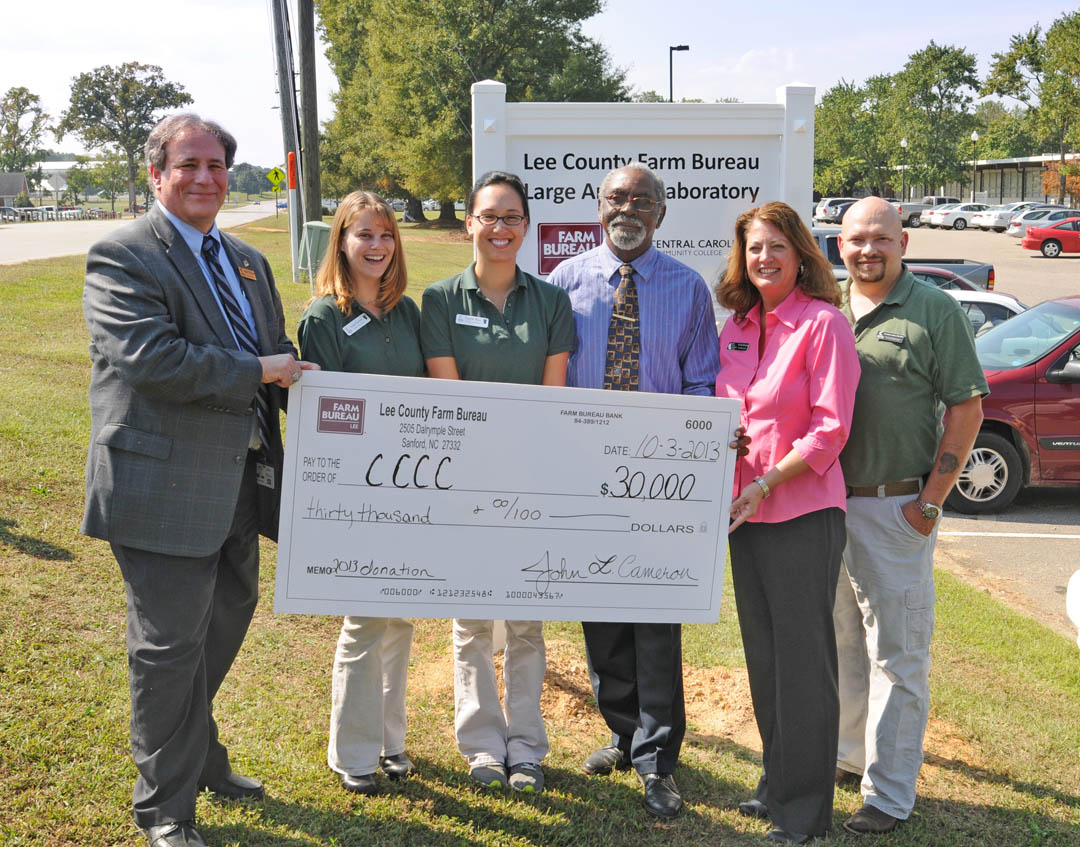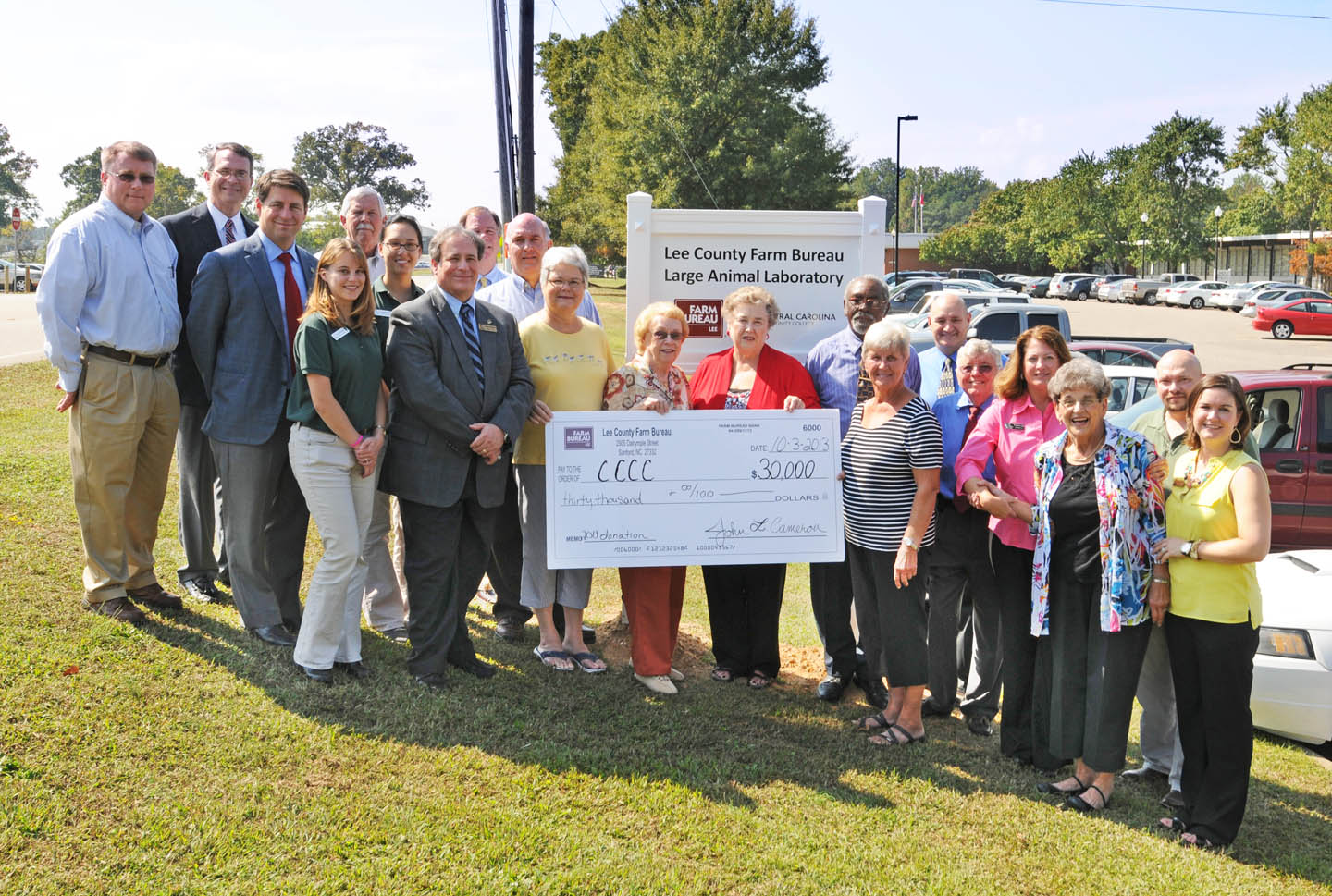College News
Farm Bureau gives $30,000 to CCCC Vet Med Tech program
Notice: This article is older than 12 months. Names, contact information, programs, titles, etc. might have changed. If you have any problems please call the main college number, 1-800-682-8353, and we will be happy to direct you accordingly.

click image to enlarge ⊗
The Lee County Farm Bureau presented a $30,000 check to the Central Carolina Community College Foundation ... (more)

click image to enlarge ⊗
Members of the Lee County Farm Bureau, CCCC administrators, and Veterinary Medical Technology instructors ... (more)
11.08.2013 • College & Community • College General
SANFORD - A $30,000 grant from the Lee County Farm Bureau to Central Carolina Community College's Veterinary Medical Technology program will purchase new equipment that is expected to make the program even more competitive.
According to VMT Department Chair Dr. Kim Browning and Instructor/Animal Facilities Manager Jonathan Loftis, the funds will be used to purchase a three-meter endoscope and two pieces of imaging equipment.
An endoscope is used to examine the interior of a hollow organ or cavity of the body. Unlike most other medical imaging devices, endoscopes are inserted directly into the organ. A three-meter endoscope is especially useful in the examination of large animals such as horses.
"The latest technology is important, particularly in training for the large animal field where there is already a shortage of veterinary technicians," Browning said. "The use of this state-of-the-art technology is vital to any medical field, and these two pieces of equipment are crucial to our VMT students' education and future career potential."
According to American Veterinary Medical Association, CCCC's Veterinary Medical Technician program is ranked among the top five in the country.
"We feel this new equipment will definitely help us maintain that status," Browning said. "Being able to train students in this technology makes them more marketable. With the need for veterinary technicians expected to rise approximately 52 percent over the next 10 years, our students typically have at least three job offers before they graduate."
Established in 1964, the college's VMT program was the first of its kind in North Carolina. The program is accredited by the American Veterinary Medical Association's Committee on Veterinary Technician Education and Activities (CVTEA).
Graduates of the VMT program receive an Associate of Applied Science degree and are eligible to work in any number of settings, including private veterinary practices, research facilities, pharmaceutical companies, diagnostic laboratories, zoos, wildlife rehabilitation centers, state and federal agencies, veterinary teaching hospitals and specialty and emergency practices.
The faculty are well-educated professionals, licensed veterinarians and veterinary medical technicians dedicated to exceptional animal health care and teaching
Students study nutrition, diseases, anatomy, radiology, parasitology, pharmacology, dental, surgical and clinical procedures, anesthesiology, lab techniques, and office practices. The program has a diverse animal population, a large dog and cat ward, on-campus labs and an off-campus large animal facility.
"VMT students begin their studies with the bare essentials of veterinary care such as learning how to lift and carry animals," said Loftis. "They progress to injections, sample collection, anesthesia, dental prophylaxis, surgical assistance and radiology."
The training also includes instructional seminars featuring speakers from N.C. State University's College of Veterinary Medicine, representatives from pharmaceutical and research facilities, specialty hospitals, and members of the North Carolina Veterinary Board. Students also attend meetings and continuing education seminars sponsored by state veterinary associations.
"Essentially graduates start their professional careers as the equivalent of a physician assistant, but physician assistants learn one species and our students learn 17 while they are here," Loftis said. "They treat horses, cows, pigs, sheep goals, snakes, frogs, birds and many more species."
A student who selects research as a career can expect to earn up to $60,000 annually, Loftis explained. Those working in typical small animal clinics may earn from $25,000 to $30,000 in an entry-level position.
For more information concerning the VMT program at CCCC, contact Dr. Kim Browning at 919-718-7393 or e-mail her at kbrowning@cccc.edu.
Categories
- Admin, Faculty & Staff Category
- Arts & Entertainment Category
- Clubs Category
- College & Community Category
- College General Category
- Continuing Education Category
- Curriculum Programs Category
- Distance Education Programs Category
- Facilities/Buildings Category
- Finances Category
- Foundation Category
- Graduations Category
- Lee Early College Category
- NCCCS Category
- SGA Category
- Special Events Category
- Sports Category
- Students/Graduates Category
- Uncategorized Category
Archives

